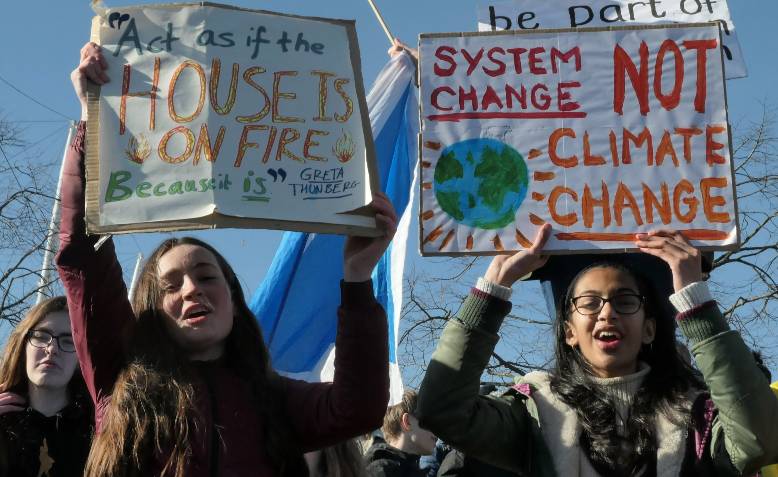 Climate strike, March 2019. Photo: Magnus Hagdorn / CC BY-SA 2.0
Climate strike, March 2019. Photo: Magnus Hagdorn / CC BY-SA 2.0
Climate policies have to be connected to and central to the demands of every movement, making it clear that we won’t accept anything less than radical change, argues Feyzi Ismail
The upcoming Cop26 is probably the most important climate conference ever. First, because it comes at a time when unprecedented extreme weather events are taking place on a regular basis, with the scale of devastation unexpected and untold.
Second, because we are almost out of time to make radical reversals in the burning of fossil fuels and to reorganise our economies such that we put an end to fossil fuel extraction. Will Cop26, hosted by the Tory government, lead us in this direction?
No, the Tories are desperate to carry on with business as usual. But they will want to show that they are making commitments and taking action, however limited. The negotiations at Cop26 are certainly not the last word on climate solutions, but how we influence it is crucial.
We already know that many governments and politicians, including the Tories, continue to grant licenses for oil and gas exploration. They fund subsidies for fossil fuel companies and defend climate denial. They greenwash their militaries and focus on individual consumption – watching our carbon footprints and so on – as the solution to the crisis.
The Cop24 that took place in Poland at the end of 2018 was sponsored by a leading coal company.
Those in power have the capacity to impose solutions on the scale that we need them in every country: nationalising utilities such that power generation can come from renewables; mass programmes of reforestation by banning companies from logging and protecting green spaces; drastic reductions in air pollution by instituting mass transport based on alternative energy; ending subsidies to fossil fuel companies and transforming them into sites for carbon capture and storage; retraining millions of workers in polluting industries, to name a few.
But none of this will happen without mass pressure. The only way that governments will introduce and implement the changes we need is through pressure from the mass movements against the climate crisis, but also against war, austerity, racism, and so on.
Climate policies have to be connected to and central to the demands of every movement. The movements have to provide a strong, urgent, unequivocal message to the politicians present in Glasgow: that we won’t countenance anything less than radical changes now.
Pressure will also come from workplace struggle. Every trade union needs to have climate policies that reflect the depth and scale of the crisis, and every trade unionist needs to see themselves as playing a role in the transition towards a new kind of economy.
Ultimately, the Tory government will have to go if we are to see the changes we need. But even before then, we can force them to act. Cop26 presents an opportunity for the left to scale up its response, given that the crisis has suddenly and forcefully come to the forefront of people’s consciousness. We have to make Cop26 a turning point for the movement.
From this month’s Counterfire freeshseet
Fund the fightback
We urgently need stronger socialist organisation to push for the widest possible resistance and put the case for change. Please donate generously to this year’s Counterfire appeal and help us meet our £25,000 target as fast as possible.

